What is the usage of distinct in oracle?
Oracle's distinct usage can filter duplicate rows in the result set to ensure that the value of the specified column or columns returned in the "SELECT" clause is unique. The syntax is "SELECT DISTINCT column 1, column 2, column 3... from table name". "distinct" will sort the returned result set and can be used in conjunction with "order by" to improve efficiency.

#The operating environment of this article: Windows 10 system, Oracle version 19c, DELL G3 computer.
Oracle Distinct Usage
SELECT DISTINCT can be used to filter duplicate rows in the result set to ensure that the value of one or more columns specified in the SELECT clause is unique. .
Only use it to return the number of non-duplicate records, rather than use it to return all values of non-duplicate records. The reason is that distinct can only be solved by double loop query, which will undoubtedly directly affect the efficiency of a website with a very large amount of data.
distinct will sort the returned result set, so it is best to use it in conjunction with order by to improve efficiency.
Oracle SELECT DISTINCT usage
The syntax of the SELECT DISTINCT statement is as follows:
SELECT DISTINCT
column_1
FROM
table_name;In the above syntax, the value in the column_1 column of the table_name table will Compare to filter duplicates.
To retrieve unique data based on multiple columns, just specify the list of columns in the SELECT clause as follows:
SELECT DISTINCT column_1,
column_2,
...
FROM
table_name;In this syntax, the values in column_1, column_2 and column_n The combination is used to determine the uniqueness of the data.
The DISTINCT clause can only be used in a SELECT statement.
Please note that there is no difference between DISTINCT and UNIQUE in Oracle. They are synonyms. DISTINCT follows the ANSI standard, and UNIQUE is Oracle-specific. From a transplant perspective, it is better to use DISTINCT that follows the ANSI standard. s Choice.
Oracle DISTINCT Example
Let’s take a look at some examples of how to use SELECT DISTINCT to see how it works.
1. A simple example of Oracle DISTINCT
The following is a table
字段1 字段2 id name 1 a 2 b 3 c 4 c 5 b
If you want to use one statement to query all data with non-duplicate names, you must use distinct Remove redundant duplicate records. So first enter:
select *, count(distinct name) from table group by name
Then we enter:
id name count(distinct name)
and get the result:
1 a 1 2 b 1 3 c 1
2. Examples of Oracle DISTINCT applied on a column
are as follows Example to retrieve the names of all contacts:
SELECT first_name FROM contacts ORDER BY first_name;
Execute the above query statement and get the following results:
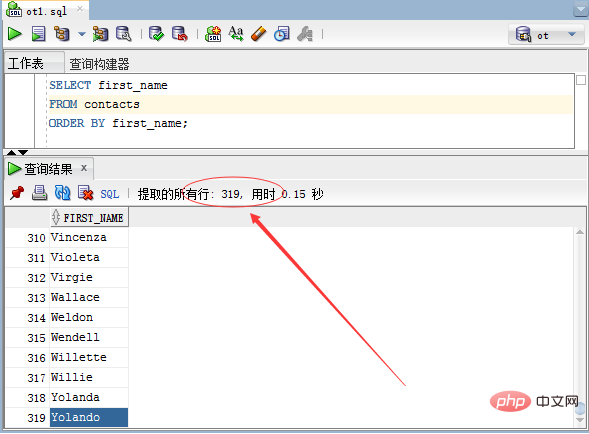
The query returned 319 rows, indicating that the contact ( contacts) table has 319 rows.
To get unique contact names, you can add the DISTINCT keyword to the SELECT statement above, as shown below:
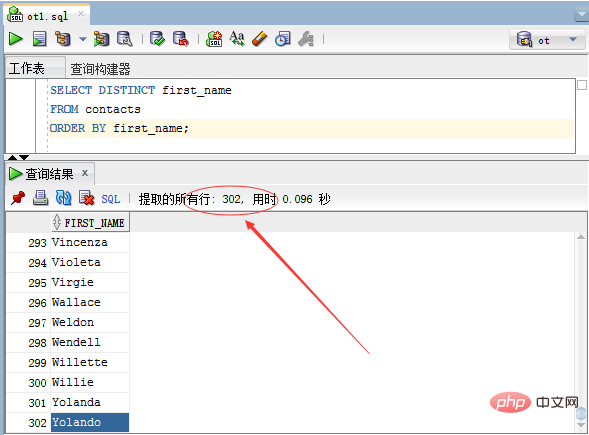
The query returned Row 302 means that 17 rows in the contacts table are duplicates and they have been filtered.
2. Oracle DISTINCT application multi-column example
Look at the order_items table below. The structure of the table is as follows:
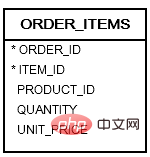
The following statements are from order_items Select different product IDs and quantities in the table:
SELECT
DISTINCT product_id,
quantity
FROM
ORDER_ITEMS
ORDER BY product_id;Execute the above query statement and get the following results
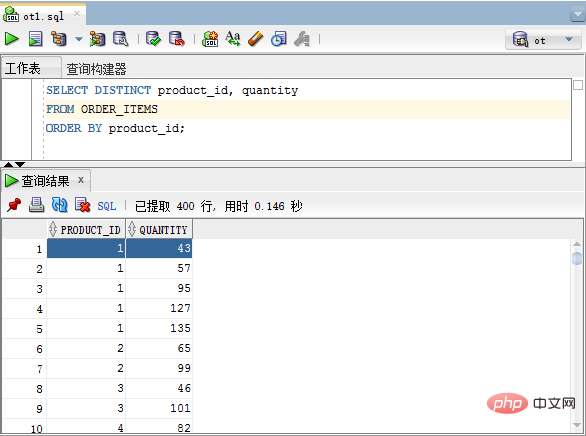
In this example, the product_id and quantity columns Values are used to evaluate the uniqueness of rows in the result set.
3. Oracle DISTINCT and NULL
DISTINCT treats NULL values as duplicate values. If you use the SELECT DISTINCT statement to query data from a column with multiple NULL values, the result set contains only one NULL value.
See the locations table in the sample database, the structure is as follows:
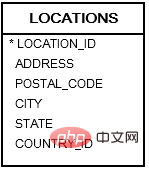
The following statement retrieves data with multiple NULL values from the state column:
SELECT DISTINCT state FROM locations ORDER BY state NULLS FIRST;
Execute the above example code and get the following results:
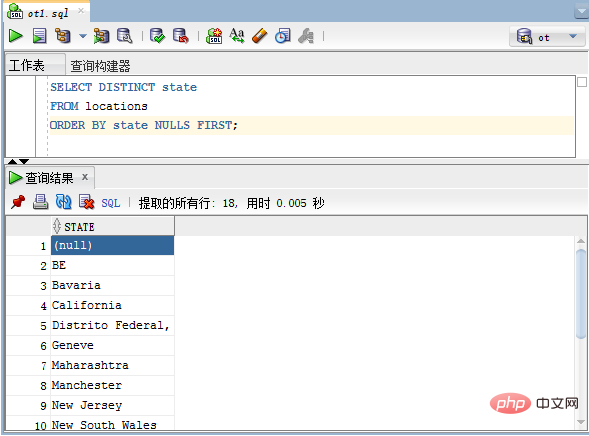
As you can see in the picture above, only a NULL value is returned.
The above is the detailed content of What is the usage of distinct in oracle?. For more information, please follow other related articles on the PHP Chinese website!

Hot AI Tools

Undresser.AI Undress
AI-powered app for creating realistic nude photos

AI Clothes Remover
Online AI tool for removing clothes from photos.

Undress AI Tool
Undress images for free

Clothoff.io
AI clothes remover

Video Face Swap
Swap faces in any video effortlessly with our completely free AI face swap tool!

Hot Article

Hot Tools

Notepad++7.3.1
Easy-to-use and free code editor

SublimeText3 Chinese version
Chinese version, very easy to use

Zend Studio 13.0.1
Powerful PHP integrated development environment

Dreamweaver CS6
Visual web development tools

SublimeText3 Mac version
God-level code editing software (SublimeText3)

Hot Topics
 1386
1386
 52
52
 How to check tablespace size of oracle
Apr 11, 2025 pm 08:15 PM
How to check tablespace size of oracle
Apr 11, 2025 pm 08:15 PM
To query the Oracle tablespace size, follow the following steps: Determine the tablespace name by running the query: SELECT tablespace_name FROM dba_tablespaces; Query the tablespace size by running the query: SELECT sum(bytes) AS total_size, sum(bytes_free) AS available_space, sum(bytes) - sum(bytes_free) AS used_space FROM dba_data_files WHERE tablespace_
 How to view instance name of oracle
Apr 11, 2025 pm 08:18 PM
How to view instance name of oracle
Apr 11, 2025 pm 08:18 PM
There are three ways to view instance names in Oracle: use the "sqlplus" and "select instance_name from v$instance;" commands on the command line. Use the "show instance_name;" command in SQL*Plus. Check environment variables (ORACLE_SID on Linux) through the operating system's Task Manager, Oracle Enterprise Manager, or through the operating system.
 How to encrypt oracle view
Apr 11, 2025 pm 08:30 PM
How to encrypt oracle view
Apr 11, 2025 pm 08:30 PM
Oracle View Encryption allows you to encrypt data in the view, thereby enhancing the security of sensitive information. The steps include: 1) creating the master encryption key (MEk); 2) creating an encrypted view, specifying the view and MEk to be encrypted; 3) authorizing users to access the encrypted view. How encrypted views work: When a user querys for an encrypted view, Oracle uses MEk to decrypt data, ensuring that only authorized users can access readable data.
 How to uninstall Oracle installation failed
Apr 11, 2025 pm 08:24 PM
How to uninstall Oracle installation failed
Apr 11, 2025 pm 08:24 PM
Uninstall method for Oracle installation failure: Close Oracle service, delete Oracle program files and registry keys, uninstall Oracle environment variables, and restart the computer. If the uninstall fails, you can uninstall manually using the Oracle Universal Uninstall Tool.
 How to delete all data from oracle
Apr 11, 2025 pm 08:36 PM
How to delete all data from oracle
Apr 11, 2025 pm 08:36 PM
Deleting all data in Oracle requires the following steps: 1. Establish a connection; 2. Disable foreign key constraints; 3. Delete table data; 4. Submit transactions; 5. Enable foreign key constraints (optional). Be sure to back up the database before execution to prevent data loss.
 How to solve the problem of closing oracle cursor
Apr 11, 2025 pm 10:18 PM
How to solve the problem of closing oracle cursor
Apr 11, 2025 pm 10:18 PM
The method to solve the Oracle cursor closure problem includes: explicitly closing the cursor using the CLOSE statement. Declare the cursor in the FOR UPDATE clause so that it automatically closes after the scope is ended. Declare the cursor in the USING clause so that it automatically closes when the associated PL/SQL variable is closed. Use exception handling to ensure that the cursor is closed in any exception situation. Use the connection pool to automatically close the cursor. Disable automatic submission and delay cursor closing.
 How to check invalid numbers of oracle
Apr 11, 2025 pm 08:27 PM
How to check invalid numbers of oracle
Apr 11, 2025 pm 08:27 PM
Oracle Invalid numeric errors may be caused by data type mismatch, numeric overflow, data conversion errors, or data corruption. Troubleshooting steps include checking data types, detecting digital overflows, checking data conversions, checking data corruption, and exploring other possible solutions such as configuring the NLS_NUMERIC_CHARACTERS parameter and enabling data verification logging.
 How to create cursors in oracle loop
Apr 12, 2025 am 06:18 AM
How to create cursors in oracle loop
Apr 12, 2025 am 06:18 AM
In Oracle, the FOR LOOP loop can create cursors dynamically. The steps are: 1. Define the cursor type; 2. Create the loop; 3. Create the cursor dynamically; 4. Execute the cursor; 5. Close the cursor. Example: A cursor can be created cycle-by-circuit to display the names and salaries of the top 10 employees.



